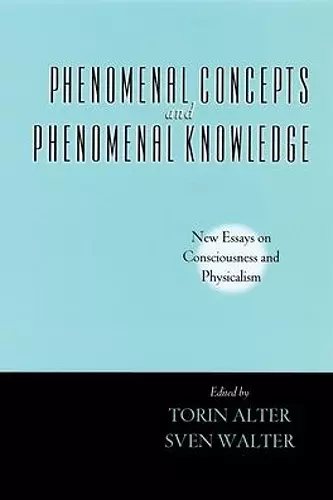Phenomenal Concepts and Phenomenal Knowledge
New Essays on Consciousness and Physicalism
Sven Walter editor Torin Alter editor
Format:Paperback
Publisher:Oxford University Press Inc
Published:6th Nov '08
Currently unavailable, and unfortunately no date known when it will be back
This paperback is available in another edition too:
- Hardback£40.49(9780195171655)

What is the nature of consciousness? How is consciousness related to brain processes? This volume collects thirteen new papers on these topics: twelve by leading and respected philosophers and one by a leading color-vision scientist. All focus on consciousness in the "phenomenal" sense: on what it's like to have an experience. Consciousness has long been regarded as the biggest stumbling block for physicalism, the view that the mind is physical. The controversy has gained focus over the last few decades, and phenomenal knowledge and phenomenal concepts-knowledge of consciousness and the associated concepts-have come to play increasingly prominent roles in this debate. Consider Frank Jackson's famous case of Mary, the super-scientist who learns all the physical information while confined in a black-and-white room. According to Jackson, if physicalism is true, then Mary's physical knowledge should allow her to deduce what it's like to see in color. Yet it seems intuitively clear that she learns something when she leaves the room. But then how can consciousness be physical? Arguably, whether this sort of reasoning is sound depends on how phenomenal concepts and phenomenal knowledge are construed. For example, some argue that the Mary case reveals something about phenomenal concepts but has no implications for the nature of consciousness itself. Are responses along these lines adequate? Or does the problem arise again at the level of phenomenal concepts? The papers in this volume engage with the latest developments in this debate. The authors' perspectives range widely. For example, Daniel Dennett argues that anti-physicalist arguments such as the knowledge argument are simply confused; David Papineau grants that such arguments at least reveal important features of phenomenal concepts; and David Chalmers defends the anti-physicalist arguments, arguing that the "phenomenal concept strategy" cannot succeed.
a useful book I would recommend to those who are working on consciousness and physicalism * Istvan Aranyosi MIND *
ISBN: 9780195377040
Dimensions: 152mm x 231mm x 23mm
Weight: 522g
360 pages